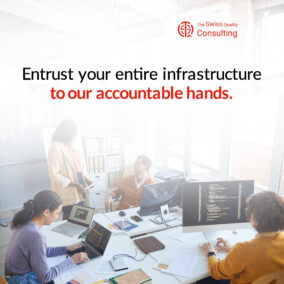Leveraging Infrastructure as Code for DevOps in Saudi Arabia and UAE
The Importance of Infrastructure as Code in Modern DevOps Practices
One of the key practices in this realm is Infrastructure as Code (IaC), which involves managing and provisioning computing infrastructure through machine-readable code. IaC ensures consistency, scalability, and reliability in infrastructure management, making it a cornerstone of modern DevOps strategies.
IaC allows for the automation of infrastructure provisioning, which significantly reduces the risk of human error. By defining infrastructure in code, organizations can ensure that their environments are configured consistently every time. This consistency is critical in maintaining the stability and reliability of applications, especially in complex environments. For cities like Riyadh and Dubai, where technological innovation is a priority, IaC provides the foundation for building resilient and scalable IT infrastructure.
Moreover, IaC enhances the scalability of infrastructure management. Traditional methods of manually configuring and provisioning servers and networks are time-consuming and prone to errors. With IaC, infrastructure can be scaled up or down quickly and efficiently, meeting the dynamic needs of businesses. This scalability is particularly important in the context of the rapidly growing digital economies of Saudi Arabia and the UAE, where businesses must be agile and responsive to market changes.
Implementing Infrastructure as Code in DevOps
Implementing Infrastructure as Code requires a strategic approach and the right set of tools and technologies. Popular IaC tools such as Terraform, Ansible, and CloudFormation enable organizations to define and manage their infrastructure in code. These tools support various cloud platforms, allowing for seamless integration and management of infrastructure across different environments.
Terraform, for instance, is a widely used IaC tool that allows for the provisioning and management of infrastructure across multiple cloud providers. Its declarative configuration language makes it easy to define and manage infrastructure resources, ensuring consistency and reproducibility. Ansible, on the other hand, is known for its simplicity and ease of use, making it a popular choice for configuration management and automation. CloudFormation, a service by Amazon Web Services (AWS), provides a comprehensive framework for defining and managing AWS resources.
Artificial intelligence (AI) and blockchain technology can further enhance the implementation of IaC in DevOps. AI can be used to optimize infrastructure provisioning and management by predicting resource requirements and identifying potential issues before they occur. Blockchain technology can provide a secure and transparent platform for managing infrastructure changes, ensuring that all modifications are tracked and auditable. By leveraging these advanced technologies, businesses in Riyadh and Dubai can achieve greater efficiency, security, and reliability in their DevOps practices.
Driving Business Success through Infrastructure as Code
Leveraging IaC for Corporate Innovation
Businesses in Saudi Arabia and the UAE can greatly benefit from integrating Infrastructure as Code into their IT strategies. By adopting IaC, companies can enhance their innovation capabilities, reduce operational costs, and improve overall efficiency. This commitment to modern technology and automation not only supports corporate social responsibility goals but also strengthens the company’s market position and customer loyalty.
The use of IaC also offers significant cost-saving opportunities. By automating infrastructure provisioning and management, companies can reduce the need for manual intervention, minimizing the risk of errors and reducing operational costs. Additionally, the ability to quickly scale infrastructure up or down based on demand can lead to more efficient use of resources and better cost management. In the competitive markets of Riyadh and Dubai, these advantages can provide a significant edge.
Effective leadership and project management are essential for successfully implementing IaC in business operations. Business executives and project managers must ensure that all aspects of these projects are meticulously planned and executed. This involves coordinating with technology providers, understanding the specific needs of different departments, and ensuring that all team members are adequately trained to support these advanced systems. By adopting best practices in project management, businesses can ensure that their IaC initiatives are well-structured and efficient, driving long-term success and sustainability.
Leadership and Project Management in IaC Implementation
Effective leadership and project management are crucial for the successful integration of Infrastructure as Code in business operations. Business executives and project managers must ensure that all aspects of these projects are meticulously planned and executed. This involves coordinating with technology providers, understanding the specific needs of different departments, and ensuring that all team members are adequately trained to support these advanced systems.
In the dynamic environments of Riyadh and Dubai, where rapid development and innovation are the norms, robust project management practices are essential. By adopting best practices in project management, businesses can ensure that their IaC initiatives are well-structured and efficient. This includes setting clear objectives, allocating resources effectively, and continuously monitoring progress to identify and address potential issues promptly.
Training and development are also critical components of successful project management in this context. Business leaders must invest in building the skills and capabilities of their teams, ensuring they are equipped to handle the complexities of IaC systems. By fostering a culture of continuous learning and improvement, organizations can enhance their resilience and ensure they are always prepared to respond to various infrastructure challenges effectively.
Additional Considerations for Business Leaders
Business leaders must recognize the importance of investing in technology and infrastructure that supports the integration of Infrastructure as Code. This involves not only the initial deployment of these platforms but also the ongoing maintenance and upgrades necessary to keep these systems running efficiently. Additionally, fostering partnerships with technology providers and IaC experts can enhance the overall effectiveness of IaC strategies, ensuring that businesses are well-prepared for any eventuality.
Continuous Improvement and Adaptation
Finally, it is essential to establish a framework for continuous improvement and adaptation. As new technologies emerge and infrastructure challenges evolve, IaC systems must be regularly reviewed and updated. By staying ahead of technological advancements and incorporating them into existing strategies, businesses and authorities in Riyadh and Dubai can ensure that their infrastructure management efforts remain robust and effective. This proactive approach not only enhances resilience but also positions organizations as leaders in innovation and IaC practices.
Conclusion: Building a Resilient Future with Infrastructure as Code
The integration of Infrastructure as Code is essential for enhancing the consistency, scalability, and reliability of IT infrastructure. By leveraging modern technologies such as AI and blockchain, authorities and businesses in Saudi Arabia and the UAE can develop robust and reliable IaC strategies. These advancements not only improve infrastructure management and automation but also drive business success and innovation. As we continue to embrace these technologies, it is crucial for business leaders to prioritize collaboration, adaptability, and continuous improvement, ensuring that we are always prepared for the challenges of the future.
#InfrastructureAsCode #DevOps #Automation #Consistency #Scalability #AI #Blockchain #SaudiArabia #UAE #Riyadh #Dubai #BusinessSuccess #Leadership #ProjectManagement























